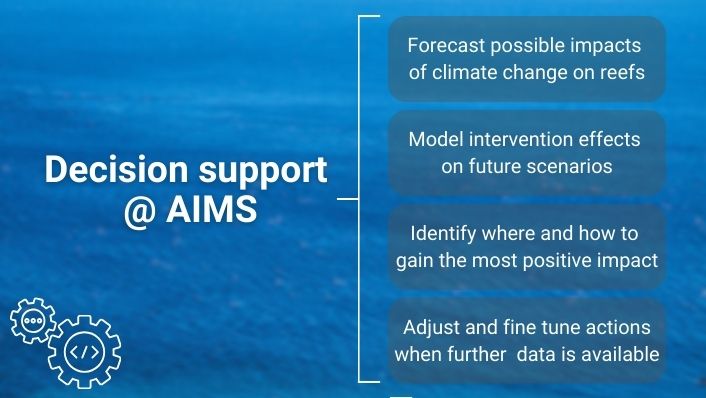In a warming world, coral reefs face unprecedented challenges.
While best-practice conventional management and reducing carbon emissions are essential; on their own, they are unlikely to be enough to sustain coral reefs in the face of continued climate change.
AIMS is working with scientists around the world to develop approaches that can help coral reefs remain resilient and sustain the values reefs provide.
Such approaches need guidance to ensure they can be effectively deployed to help coral reefs in an uncertain future.
AIMS’ Decision Support team is developing a suite of models and guidance systems to help environmental decision makers be informed when they balance priorities to optimise effort and outcomes.
How do we make the best-informed decisions?
Developing new technologies for environmental management carries risks, but delaying action represents lost opportunity to sustain coral reefs in a rapidly closing window.
Deciding where, when, and how to intervene – if at all – using new reef restoration and adaptation measures is challenging.
AIMS’ Decision Support team is developing tools to enable us to:
-
forecast the impact of the possible range of future temperature increases and other stressors on coral reefs
-
model how this would vary with the introduction of novel environmental management techniques – or interventions – and the effect of layering different interventions on reefs
-
identify where and how we are likely to get the most positive impact
-
adjust and fine-tune our actions as we have further information.
Adaptive Dynamic Reef Intervention Algorithms (ADRIA)
Models are simplified versions of reality to help us explore what might happen in the future.
As there is always uncertainty in the information available, there will always be a level of uncertainty in what models project.
For example, while experts have a good general idea of what conditions we will face in the future, we don't know exactly how hot it will get, how many cyclones we might have and how corals and reef ecosystems will react to those conditions.
To reduce uncertainty, AIMS has developed the Adaptive Dynamic Reef Interventions Algorithms (ADRIA) platform to provide an integrated approach to decision support in reef management.
It allows us to explore what might happen under a wide variety of conditions, deploying different combinations of novel interventions, using a range of models to consider and manage uncertainty.
The aim is to help risk managers and decision makers develop adaptive plans and policies that maximise ecological, economic, and social and cultural outcomes.
The team is currently identifying robust, strategic, and tactical intervention options in space and time under climate change for the Reef Restoration and Adaptation Program (RRAP).
Filling the knowledge gap
ADRIA also helps us recognise when conditions are shifting, so reef managers can develop plans and policies that are adaptive to changing conditions, to ensure they're better prepared.
Once we have a good idea of what strategies might work, we explore them further using different, more complex ecosystem models.
There is still much knowledge to be gained about coral reef ecosystems to inform ADRIA and reduce uncertainty. AIMS is leading significant research to help fill this knowledge gap.
Apart from modelling strategies to maximise coral cover, ADRIA can also be used to build capacity for other marine life and reef-related ecosystems. For example, we connect impacts of climate change on corals and seagrasses to consequences for fish and other marine species. We can then model how management actions might generate positive impacts to help sustain tropical marine ecosystems in the face of climate change and other stressors.
How ADRIA works
ADRIA consists of:
-
smart heuristics (shortcuts to make judgements and problem-solve)
-
and scenario exploration and analysis
ADRIA works in tandem with existing ecosystem models such as C~Scape, a coral life-cycle model developed at AIMS, and the University of Queensland’s ReefMod, which provides a whole of Great Barrier Reef simulation.


